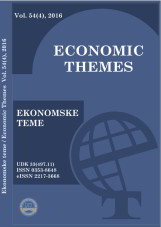Economic Themes (2016) 54 (4) 6, 549-562
Maja Strugar Jelača, Radmila Bjekić, Bojan Leković
Abstract: Leadership is a topic that attracts the attention of a large number of scientists and researchers who in their papers examine the issues of effective leadership. During previous research in this area different methodologies were used, but in recent decades one of the most prominent is MLQ questionnaire (Multifactor Leadership Questionnaire - MLQ), which examines three styles of leadership: transformational, transactional and passive leadership. The paper analyses the predominating attitudes in this area, theoretical explanation of MLQ questionnaire components and empirical results of previous applications. Founded on the obtained theoretical basis, the paper suggests future research framework in order to examine implementation of certain leadership styles from the MLQ questionnaire depending on the business environment which can vary from stable to uncertain, as well as their relationship with the achieved level of firm innovativeness. Thus, the aim of this paper is to define research framework that will be applied in a future research on an adequate sample of medium and large companies on the territory of the Republic of Serbia.
Keywords: leadership styles; MLQ questionnaire; environment uncertainty; firm innovativeness
A PROPOSAL FOR RESEARCH FRAMEWORK BASED ON THE THEORETICAL ANALYSIS AND PRACTICAL APPLICATION OF MLQ QUESTIONNAIRE
Maja Strugar Jelača, Radmila Bjekić, Bojan Leković
Abstract: Leadership is a topic that attracts the attention of a large number of scientists and researchers who in their papers examine the issues of effective leadership. During previous research in this area different methodologies were used, but in recent decades one of the most prominent is MLQ questionnaire (Multifactor Leadership Questionnaire - MLQ), which examines three styles of leadership: transformational, transactional and passive leadership. The paper analyses the predominating attitudes in this area, theoretical explanation of MLQ questionnaire components and empirical results of previous applications. Founded on the obtained theoretical basis, the paper suggests future research framework in order to examine implementation of certain leadership styles from the MLQ questionnaire depending on the business environment which can vary from stable to uncertain, as well as their relationship with the achieved level of firm innovativeness. Thus, the aim of this paper is to define research framework that will be applied in a future research on an adequate sample of medium and large companies on the territory of the Republic of Serbia.
Keywords: leadership styles; MLQ questionnaire; environment uncertainty; firm innovativeness

